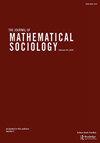个性化的模糊过程
IF 1.3
4区 社会学
Q3 MATHEMATICS, INTERDISCIPLINARY APPLICATIONS
引用次数: 0
摘要
本文证明了个性化过程的一个方面可以被认为是一个模糊集。在哲学史上,个性化的过程一直被解释为一个双值问题。在这项工作中,我打算表明,在社会心理方面,这样的过程可以更好地理解为一个模糊集,以连续体隶属函数为特征。根据这一观点,物种及其成员表现出不同程度的个性化。这种程度是通过个性化心理社会过程的隶属函数来衡量的。因此,建议在人类社会中使用这种方法进行社会分析。本文章由计算机程序翻译,如有差异,请以英文原文为准。
A fuzzy process of individuation
ABSTRACT It is shown that an aspect of the process of individuation may be thought of as a fuzzy set. The process of individuation has been interpreted as a two-valued problem in the history of philosophy. In this work, I intend to show that such a process in its psychosocial aspect is better understood in terms of a fuzzy set, characterized by a continuum membership function. According to this perspective, species and their members present different degrees of individuation. Such degrees are measured from the membership function of the psychosocial process of individuation. Thus, a social analysis is suggested by using this approach in human societies.
求助全文
通过发布文献求助,成功后即可免费获取论文全文。
去求助
来源期刊

Journal of Mathematical Sociology
数学-数学跨学科应用
CiteScore
2.90
自引率
10.00%
发文量
5
审稿时长
>12 weeks
期刊介绍:
The goal of the Journal of Mathematical Sociology is to publish models and mathematical techniques that would likely be useful to professional sociologists. The Journal also welcomes papers of mutual interest to social scientists and other social and behavioral scientists, as well as papers by non-social scientists that may encourage fruitful connections between sociology and other disciplines. Reviews of new or developing areas of mathematics and mathematical modeling that may have significant applications in sociology will also be considered.
The Journal of Mathematical Sociology is published in association with the International Network for Social Network Analysis, the Japanese Association for Mathematical Sociology, the Mathematical Sociology Section of the American Sociological Association, and the Methodology Section of the American Sociological Association.
 求助内容:
求助内容: 应助结果提醒方式:
应助结果提醒方式:


